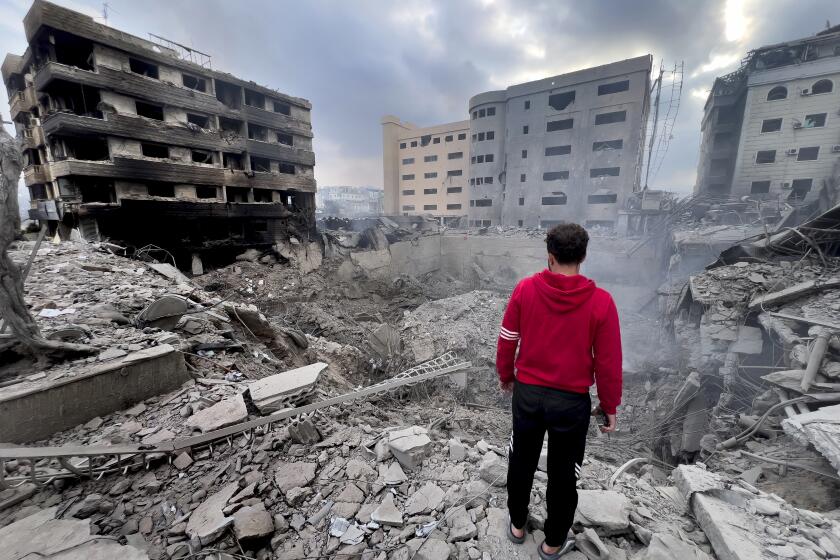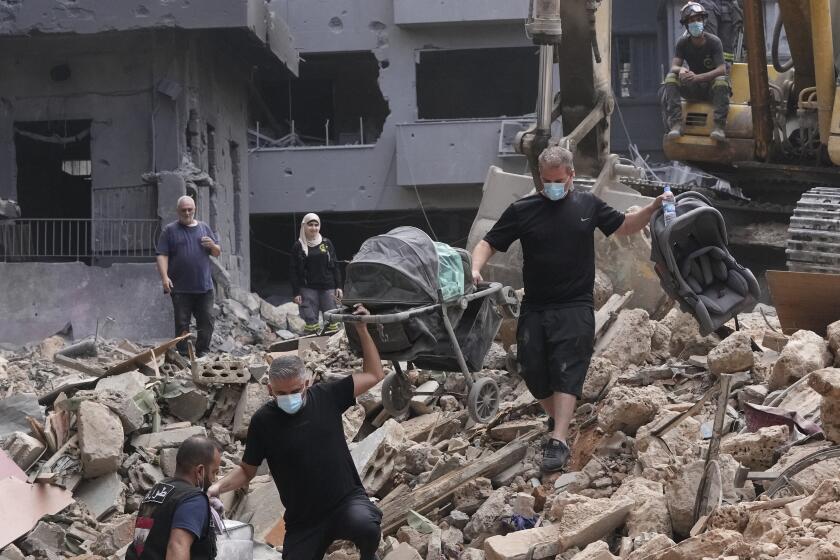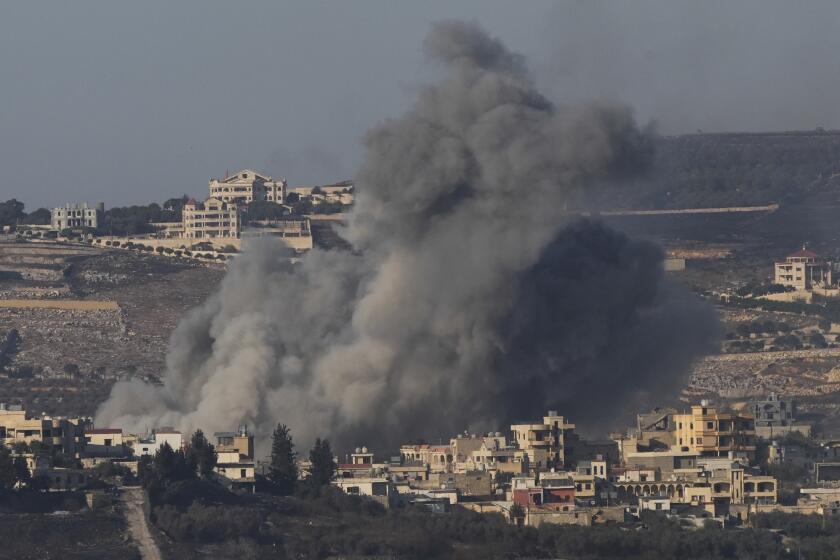Drone strike in Israel wounds more than 60 people. Hezbollah claims responsibility

- Share via
DEIR AL BALAH, Gaza Strip — A drone strike hit central Israel on Sunday, wounding more than 60 people, some of them critically, rescue services said, in one of the bloodiest attacks in Israel in a year of war. The Lebanon-based Hezbollah militant group claimed responsibility, saying it targeted a military camp.
Hezbollah said the strike was retaliation for two Israeli strikes in Beirut on Thursday that killed 22 people.
With Israel’s advanced air-defense systems, it’s rare for so many people to be hurt by drones or missiles. Israeli media reported that two drones were launched from Lebanon, and the military said one was intercepted.
It was not immediately clear whether military members were hurt or what was hit in the city of Binyamina. There were no details from Israel’s military, which earlier reported that at least 115 rockets were fired from Lebanon.
It was the second time in two days that a drone has struck in Israel. On Saturday, during the Jewish holiday of Yom Kippur, one hit a suburb of Tel Aviv, causing damage but no injuries.
The latest strike came on the same day that the United States announced it would send a new air-defense system to Israel to help bolster its protection against missiles, along with the troops needed to operate it. An Israeli army spokesperson declined to provide a timeline.
Israel is now at war with Hamas in Gaza and Hezbollah in Lebanon — both Iran-backed militant groups — and is expected to strike Iran in retaliation for a missile attack earlier this month, though it has not said how or when. Iran has said it will respond to any Israeli attack.
Hezbollah critics and supporters alike are voicing frustration over what many view as the group’s miscalculations.
Netanyahu calls U.N. peacekeepers ‘human shield’ for Hezbollah
The U.N. peacekeeping force in Lebanon known as UNIFIL said Israeli tanks forcibly entered the gates of one of its positions early Sunday and destroyed the main gate, and later fired smoke rounds near peacekeepers in that location, causing skin irritation. UNIFIL said the incident was a “further flagrant violation of international law.”
International criticism is growing after Israeli forces have repeatedly fired on U.N. peacekeepers since the start of the ground operation in Lebanon. Five peacekeepers have been wounded in attacks that struck their positions in recent days, with most blamed on Israeli forces.
The military says Hezbollah operates in the vicinity of the peacekeepers, without providing evidence.
Israel’s military said a tank trying to evacuate wounded soldiers backed into a U.N. post while under fire. It said a smoke screen was used to provide cover.
Army spokesman Lt. Col. Nadav Shoshani asserted that Israel has tried to maintain constant contact with UNIFIL and that any instance of U.N. forces being harmed will be investigated at “the highest level.”
Prime Minister Benjamin Netanyahu on Sunday called for UNIFIL to heed Israel’s warnings to evacuate, accusing them of “providing a human shield” to Hezbollah.
“We regret the injury to the UNIFIL soldiers, and we are doing everything in our power to prevent this injury. But the simple and obvious way to ensure this is simply to get them out of the danger zone,” he said in a video addressed to the U.N. secretary-general, who has been banned from entering Israel.
Israel has long accused the United Nations of being biased against it, and relations have plunged further since the start of the war in Gaza. Israel has accused the U.N. agency for Palestinian refugees of being infiltrated by Hamas, allegations the agency denies.
Palestinians in northern Gaza are describing heavy Israeli bombardment in the hours after airstrikes killed at least 22 people.
Israeli strike in Lebanon destroys Ottoman-era market
Hezbollah began firing rockets into Israel a day after Hamas’ surprise attack on Israel on Oct. 7, 2023, drawing retaliatory airstrikes. The conflict dramatically escalated in September with Israeli strikes that killed Hezbollah’s leader, Hassan Nasrallah, and most of his senior commanders.
Israel launched a ground operation earlier this month. More than 1,400 people have been killed in Lebanon since September, according to Lebanon’s Health Ministry, which does not say how many were Hezbollah fighters. At least 54 people have been killed in rocket attacks on Israel, nearly half of them soldiers.
Israeli airstrikes overnight destroyed an Ottoman-era market in Lebanon’s southern city of Nabatiyeh, killing at least one person and wounding four more. Lebanon’s Civil Defense said it battled fires in 12 residential buildings and 40 shops in the market, which dates back to 1910.
“Our livelihoods have all been leveled,” said Ahmad Fakih, whose shop was destroyed. Rescuers searched pancaked buildings as Israeli drones buzzed overhead.
The Israeli military said it struck Hezbollah targets, without elaborating, and said it continued to target the militants on Sunday.
Separately, the Lebanese Red Cross said paramedics were searching for casualties in a house destroyed by an Israeli airstrike in southern Lebanon on Sunday, when a second strike left four paramedics with concussions and damaged two ambulances.
Christian villages in southern Lebanon thought their neutrality may spare them from violence in the Israel-Hezbollah conflict. Then the evacuation orders came.
The Red Cross said the operation had been coordinated with U.N. peacekeepers, who informed the Israeli side.
Bodies rot in the streets in northern Gaza
A year into the war with Hamas, Israel continues to strike what it says are militant targets in Gaza almost daily. A strike hit a home in the Nuseirat refugee camp late Saturday, killing parents and six children ages 8 to 23, according to Al-Aqsa Martyrs Hospital in nearby Deir al Balah. An Associated Press reporter counted the bodies there.
“They were safe, while he was sleeping, and he and all his children died,” said the man’s brother, Mohammad Abu Ghali. Women stroked the body bags, in tears.
Israel’s military says it tries to avoid harming civilians and blames their deaths on Hamas and other armed groups because they operate in densely populated areas.
In northern Gaza, Israeli air and ground forces have been attacking Jabaliya, where the military says militants have regrouped. Over the past year, Israeli forces have repeatedly returned to the built-up refugee camp, which dates back to the 1948 war surrounding Israel’s creation, and other areas.
Israel has ordered the full evacuation of northern Gaza, including Gaza City. An estimated 400,000 people remain in the north after a mass evacuation ordered in the war’s opening weeks. Palestinians fear Israel intends to permanently depopulate the north to establish military bases or Jewish settlements there.
The United Nations says no food has entered northern Gaza since Oct. 1.
A year after the Oct. 7 attack that spurred the Gaza war, Israelis and Palestinians reflect. In their voices, they chronicle a devastating day, tragic year.
The military confirmed that hospitals were included in evacuation orders but said it had not set a timetable and was working with local authorities to facilitate patient transfers.
Fares Abu Hamza, an official with the Gaza Health Ministry’s emergency service, said the bodies of a “large number of martyrs” remain uncollected from the streets and under rubble.
“We are unable to reach them,” he said, asserting that dogs are eating some remains.
The war began when Hamas-led militants attacked a year ago, killing some 1,200 people, mostly civilians, and abducting around 250. Around 100 hostages are still held in Gaza, a third believed to be dead.
Israel’s bombardment and its ground invasion of Gaza have killed over 42,000 Palestinians, according to Gaza’s Health Ministry, and left much of the territory in ruins. The ministry doesn’t distinguish between militants or civilians, but says women and children make up at least half the deaths.
Israel says it has killed over 17,000 fighters, without providing evidence.
Shurafa and Magdy write for the Associated Press. Magdy reported from Cairo. AP writers Kareem Chehayeb in Beirut and Natalie Melzer in Tel Aviv contributed to this report.
More to Read
Sign up for Essential California
The most important California stories and recommendations in your inbox every morning.
You may occasionally receive promotional content from the Los Angeles Times.














